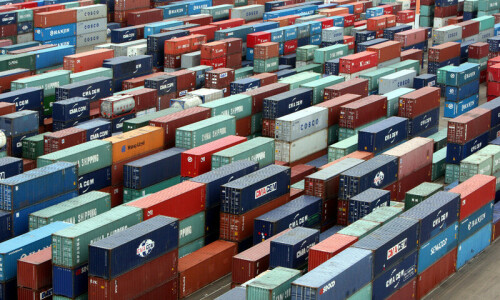KARACHI: If you think the current affordability crisis in the country’s energy sector is bad, look out for the sustainability crisis that’s about to rattle our already struggling export sector.
Analysts say the long-term future of every business that exports goods to the European Union (EU) depends in large part on the kind of electricity it uses to manufacture its products.
Starting this month, all businesses based in the EU countries are required to report on imported products that are “carbon emission-intensive,” thanks to a deal between the European Parliament and the Council of the European Union. The new regime also requires that all carbon emissions be “financially offset” 2026 onwards.
So what does it mean for Pakistani businesses? “It means the competitiveness of the Pakistani businesses will go further down in the international market if we don’t invest in sustainable and renewable energy now,” says Dr Khalid Waleed, research fellow at the Sustainable Development Policy Institute, an Islamabad-based think tank.
In simple words, products made by Pakistan’s export industries will become expensive within 10 years if their processing involves electricity generated by coal-based power plants, he says.
Officially called the Carbon Border Adjustment Mechanism (CBAM), the new set of trade rules will impose carbon fees on all imports into the EU from non-members. It means the single largest destination of Pakistani exports (bloc-wise) will be using renewable energy as a trade barrier, says Dr Waleed.
For now, the EU is imposing the CBAM on imports in six sectors, namely cement, aluminium, hydrogen, iron and steel, fertiliser and electricity. “By 2030, the CBAM regime will apply to all industries, including textiles, which constitute the largest chunk in Pakistan’s exports,” he says.
According to the implementation timeline, the CBAM quarterly reporting will begin on Oct 31. The transition phase will end on Dec 31, followed by a full rollout in 2025 when statements of emissions calculations will become due. The regime will cover all imported items Jan 1, 2030 onwards.
“This will decrease our competitiveness if we keep expanding our reliance on Thar coal while ignoring renewable energy sources,” says Dr Waleed.
Thar coal should be left underground until the methods for carbon capturing mature, he adds.
The share of local and imported coal in the electricity generation mix was 10.3pc and 4.5pc, respectively, in August, which is the latest month for which official data is available. The cumulative share of coal in the energy mix in August makes it the third biggest source of electricity after hydel (37.6pc) and imported gas (17.2pc). Other contributors to the energy mix in August were nuclear (12.8pc), local gas (7.6pc), wind (5pc), furnace oil (4.1pc) and solar (0.5pc).
Published in Dawn, October 15th, 2023












































Dear visitor, the comments section is undergoing an overhaul and will return soon.